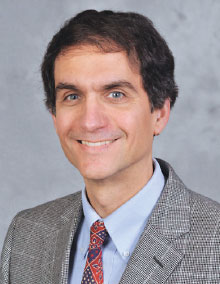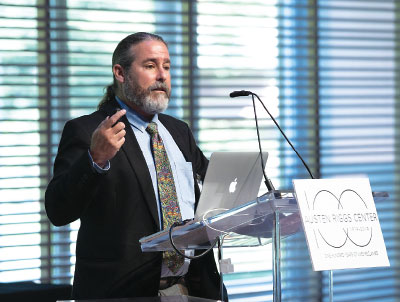Should Psychotherapy Be a Psychiatric Subspecialty?
Abstract
Does the future of psychotherapy by psychiatrists lay in subspecialization? Supporters say it will help preserve psychotherapy within psychiatry. Detractors say the idea will further diminish the role of the general psychiatrist.

“The move toward value-based health care will benefit psychotherapy by psychiatrists, because it's cost effective” says Rober Gregory, M.D.
Like many students who entered medical school in the late 1980s, just on the cusp of the advent of managed care, Robert Gregory, M.D., has watched a remarkable sea change in psychiatric practice.
Gregory said that as recently as 20 years ago, he could name 20 or 30 psychiatrists in upstate New York who identified strongly as psychotherapists and included psychotherapy in their practice. “Today I can name maybe two or three.”
He sees a still more disturbing trend in education. “Training follows the realities of clinical practice,” said Gregory, a professor of psychiatry at the State University of New York, Syracuse, and a former director of residency there. “There are fewer and fewer faculty mentors and role models for psychotherapy practice. Residents may come into training excited by psychotherapy, but it’s hard for them to sustain that enthusiasm when they don’t see it as an integral part of psychiatric practice and don’t have mentors or role models.
“We know from research that you need to learn psychotherapy by doing it. Seminars don’t work. It’s a skill set that can be expensive to teach because it requires one-on-one or small group work with lots of clinical supervision and feedback from someone with a great deal of experience.”
The Accreditation Council for Graduate Medical Education (ACGME) requires “competency” in supportive, psychodynamic, and cognitive-behavioral therapy (CBT), but Gregory sees those requirements being crowded out over time.

David Mintz, M.D., chair of the APA Caucus on Psychotherapy, says he hopes the subspecialization concept will generate discussion about the importance of retaining psychotherapy by psychiatrists.
“With increasing knowledge about neuroscience and genetics, there will need to be room in the curriculum,” he said. “There are already calls for less training in psychotherapy because it is expensive and—in the minds of some—irrelevant to the realities of clinical practice. If current trends continue, it will be only a matter of time before those training requirements are dropped.”
To counter this trend, last year Gregory and David Mintz, M.D., chair of the APA Caucus on Psychotherapy, floated a potential solution: certification in psychotherapy as a new subspecialty of psychiatry. In a paper published in The American Journal of Psychotherapy, they laid out the argument for subspecialization. They drew on the experience of the United Kingdom, where psychiatrists can subspecialize in “medical psychotherapy.”
They wrote: “Bringing all psychiatrists with special interest and expertise in psychotherapy together under one umbrella may create opportunities for advocacy with a single unified voice, greater status and recognition of enhanced psychotherapy skills, provision of psychotherapy training for all psychiatrists, and the potential for enhanced insurance reimbursement for psychotherapy in recognition of a higher skill set through fellowship training.”
Developing a Cadre of Specialists
Creation of a new psychotherapy certification would mark a dramatic and potentially disruptive change for educators and academic centers and could significantly alter the perception of the general psychiatrist. Nevertheless, it’s an idea that is attracting supporters.
“It’s a terrific idea and would help to develop a cadre of psychiatrist-psychotherapists for education, research, and specialty care,” said APA Treasurer-elect Richard Summers, M.D., former chair of the Council on Medical Education and Lifelong Learning. Summers says a subspecialty would help “embed” psychotherapy within psychiatry. “The purpose of a subspecialty is to create a pathway for training, research, and clinical specialty care that is necessary for the field. Subspecialists teach the rest of us, develop new subspecialty knowledge, and are the ones we call when we have a particularly complicated clinical problem. Every general psychiatrist needs to know the basics about psychotherapy, as they do about C-L psychiatry, addictions, and other subspecialties. In the future, only some psychiatrists will need to be subspecialty experts in performing psychotherapy.”
’Psychotherapy Is Undervalued’
Marshall Forstein, M.D., co-chair of APA’s Council on Medical Education and Lifelong Learning, doesn’t want to see a psychotherapy subspeciality. He wants to see psychotherapy by psychiatrists valued for what it is—a highly effective treatment by the only specialists who can bring a biopsychosocial perspective on patients with mental illness.
“The real issue is that psychotherapy is labor intensive and undervalued. If psychotherapy were reimbursed with parity, institutions would be able to invest more in providing psychotherapy and train residents to incorporate this skill into their armamentarium.”
And he worries about what will happen to psychotherapy training in residency if a subspecialty is created.
“If a fellowship in psychotherapy is seen as the place to learn therapy, training programs will do the bare minimum to continue to focus on training residents for higher reimbursement services,” said Forstein, who is director of residency training at the Cambridge Health Alliance. “Residents would still need to have some basic training in residency to know how to talk to patients and to perform complex diagnostic assessments of patients with comorbid medical and psychiatric disorders. Even prescribing medications requires a basic understanding of dynamics to enhance adherence to treatment.”
Forstein added that it’s unclear what level of competence is acceptable. “My residents at Cambridge Health Alliance treat patients for as long as three years and get to see the natural course of therapy and the dynamics that shift over time. How long would a fellowship have to be to make a graduate of such a certificate program competent? One year would hardly be enough. Two? Three?”
He said the ACGME requirements for psychotherapy training need to be more rigorous and focused. In addition, he suggested that providing more psychotherapy training during residency and decreasing the volume of patients managed with medication-only visits would provide the time within a residency, as has been done in his program. “Every one of our residents is supervised by an attending,” he said. “But in some programs, residents carry over a 100 or more patients, some of whom are never supervised directly, thereby allowing residents to make mistakes or, worse, inculcate behaviors that are even dangerous.”
He added, “The bottom line is the devaluation of psychotherapy. Reimbursements are insufficient to cover the costs of treatment and training, and there aren’t enough residency slots to increase the workforce, even as more medical students become interested in a career in psychiatry.”
But the idea also has detractors. Marshall Forstein, M.D., co-chair of the Council on Medical Education and Lifelong Learning and director of residency training at the Cambridge Health Alliance, said that subspecialization will only further diminish the role of general psychiatrists while creating a select subspecialty drawn from those with resources to pursue a fellowship. (see box on page 6).
“It will go the way of many subspecialties that can’t fill their training slots,” Forstein said. “Residents have enormous loans and can’t take on another year of training. This will discourage those who are not on scholarship and bias people with money and resources.” Meanwhile, he continued, if general psychiatrists are reduced to prescribing, they are at risk of being replaced by lower-cost mental health professionals.
Trends Create an Inexorable Slide
Supporters and opponents alike who spoke with Psychiatric News agreed about the economic and educational trends that appear to be working synergistically against a future for psychotherapy by psychiatrists.
“There is a lot more for psychiatrists to master today than there was when I was in training, and a lot of residents graduating today say they are uncomfortable with their training in psychotherapy,” Mintz told Psychiatric News. He cited a 2010 survey of residents in the Journal of the American Psychoanalytic Association that found most residents rated their own skills in psychodynamic psychotherapy as “poor” or “very poor.”
Mintz is director of psychiatric education at the Austen Riggs Center.
He said that the ACGME requirements for “competency” are thin gruel compared with the kind of immersive, experiential training necessary to become proficient at psychotherapy, especially psychodynamic therapy. In another era, a program might develop its own identity for training in psychotherapy; it might not offer much CBT, for example, but it might have a great depth of faculty expertise in psychodynamic therapy. Or vice versa.
“Now, the training is spread so thin,” he said. “To speak of ‘competency’ is almost Orwellian doublespeak, given the experience of graduating residents. On top of that, we have a treatment system that for cynical, economic reasons wants psychiatrists to do prescribing. The result is a slide toward psychiatrists increasingly being seen only as prescribers of medicine, neglecting the fact that psychotherapeutic skills often lead to more effective prescribing.”
To this, Gregory added the possibility that in a health care system driven increasingly by treatment algorithms, the advent of artificial intelligence (AI) has the potential to render obsolete a psychiatry that is shorn of any function except dispensing medicine.
“If we continue to head in the direction we are heading, I worry whether psychiatry will even be a viable profession,” Gregory told Psychiatric News. “A nurse practitioner with an AI software can run through the algorithm. And the AI software companies are already figuring this out.”
Matching Patients to Psychotherapy Type
But there are some hopeful portents. Whether subspecialization is the answer to the future of psychotherapy by psychiatrists, there is agreement that value-based care and the harnessing of population data to better match individual patients to a particular treatment can be good for psychotherapy.
“I think population health and value-based medicine are going to drive better coverage for psychotherapy,” Gregory said. “Psychiatrists are the unique specialists who are able to integrate biological, psychological, family, and sociocultural models of illness to see a person in front of them, instead of a diagnosis, and to focus on recovery, not just on stabilization of symptoms. In value-based population health, that’s going to be valuable because it’s cost-effective.”
Forstein said Cambridge Health Alliance is planning an initiative using data to match patient characteristics to a psychotherapeutic modality. “One of the questions we have to answer is, Which patients would benefit from which form of psychotherapy? To date there hasn’t been a good way to answer that.”
Summers agreed that’s just where psychotherapy needs to go. “The future of psychotherapy will involve much better data on matching patient needs and psychotherapy type. When patients get to choose whether they want psychodynamic or cognitive-behavioral treatment, I believe they will get better results.” ■



